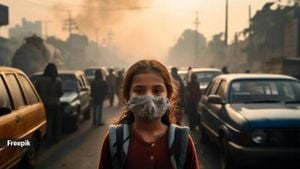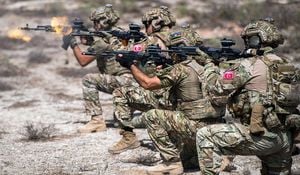Late Wednesday night, the private residence of Ana Mari Cauce, the president of the University of Washington (UW), was vandalized, sending shockwaves through the Seattle community. A group of masked individuals targeted her home and car, slashing the tires and spray-painting messages linked to pro-Palestinian sentiments and threats related to Hamas. Among the graffiti were phrases like "Free Palestine" and "blood on your hands," which signaled not just vandalism but also expressions of political dissent amid rising tensions surrounding the Israel-Hamas conflict.
Victor Balta, a spokesperson for the university, confirmed the damage, stating, "Several masked perpetrators did significant damage... including slashing her car's tires and painting pro-Hamas symbols." This incident was captured and circulated on social media, where the perpetrators touted their actions as part of larger protests threatening to escalate until the university meets demands for cutting ties with defense contractor Boeing and divesting from what they termed Zionism.
This latest act of vandalism follows months of protests at UW, where students and activists have camped out demanding broader discussions around the university's financial ties to Israel, particularly as they pertain to the Boeing Corporation. Cauce had acknowledged the protests going on earlier this year, during which the university reached agreements with encampment organizers, committing to financial support for Palestinian students.
The escalation of rhetoric and subsequent vandalism appears to stand as the culmination of growing unrest on campus over the university's response to the conflict, with protesters last spring demanding substantial reforms. The unrest reached fever pitch after Hamas launched attacks across Israel on October 7, igniting fury among pro-Palestinian groups and heightened fears within the Jewish community and its allies who saw the threats looming larger.
Pro-Palestinian supporters described this act as more than simple vandalism, characterizing it as necessary action borne out of frustration over systemic issues relating to the university's enduring partnership with military suppliers. One video showcased individuals painting inverted triangles—a symbol of dissent used on pro-Palestinian platforms—on various surfaces of Cauce's residence as they declared, "You will not know peace until you meet the demands of our movement."
Local Jewish leaders sharply condemned the actions, stating these go far beyond acceptable protest behavior. The American Jewish Committee expressed dismay, calling the vandalism "a sickening extension of the antisemitic rhetoric and violence" seen across campus. They articulated concerns over the political climate, labeling the act as not only threatening but as part of a pattern of dishonorable treatment directed at Jewish individuals and their allies.
Washington Representative Adam Smith also spoke out against the vandalism, drawing from personal experiences of having suffered similar treatment last December. “We must find greater, more constructive ways to articulate our disagreements,” he indicated. He lamented the need for constructive dialogue amid these increasingly volatile situations.
Responses from state officials, including House Speaker Laurie Jinkins and Senate Majority Leader Jamie Pedersen, noted the importance of maintaining the right to protest, but decried the actions as threatening and criminal. They issued statements making it clear, "These actions crossed the line,” stressing their commitment to community safety and peaceful discourse.
While the University President had previously stated her support for human rights and advocated for ceasefire discussions surrounding the Gaza conflict, the university's policies—especially concerning ties with Boeing—were criticized for not adequately addressing students' demands. Following the vandalism, Balta assured the public and university community alike, stating the incident would not influence university policy moving forward and emphasized the seriousness of crimes against public officials.
Law enforcement officials are now involved, with multiple agencies engaged to track down those responsible for the vandalism. Local authorities referenced the social media posts of the perpetrators as key evidence. A University of Washington statement outlined their commitment to using all available resources to identify and potentially charge those responsible.
The climate at UW during this period remains tense. Many students and faculty are characterized as feeling unsafe or targeted by both sides of the heated discourse surrounding Israel and Palestine. Cliff Mass, a professor at the university and part of the Jewish community, noted improvements on campus due to increased police presence but expressed concern over how these events may be perceived as legitimizing such violence.
University administration continues to navigate the tumultuous waters of public sentiment with some members of the community calling for more accountability from the institution—tension exacerbated by the broader public conversation about antisemitism and the ramifications of the Israel-Hamas conflict.
On top of this layer of complexity, Congress is also grappling with potential legislation aimed at addressing campus antisemitism. A newly proposed bill, with wide bipartisan support, seeks to establish formal definitions of antisemitism as part of investigations involving federally funded universities. The American Civil Liberties Union has voiced concerns over the bill possibly infringing on free speech rights, particularly those criticisms directed toward Israel.
Following these events and discussions, one must wonder what this means for future dialogues on campus and how such hostile actions influence the wider discourse on protests and political expressions. The promise of activism must tread carefully within the challenging boundaries of respect, safety, and constructive dialogue.
The incident serves as both a demonstration of the passionate responses to geopolitical conflict and as a grim reminder of the tensions simmering within academic environments. Handling protest on campuses amid sensitive historical issues remains one of the significant challenges universities face today.



